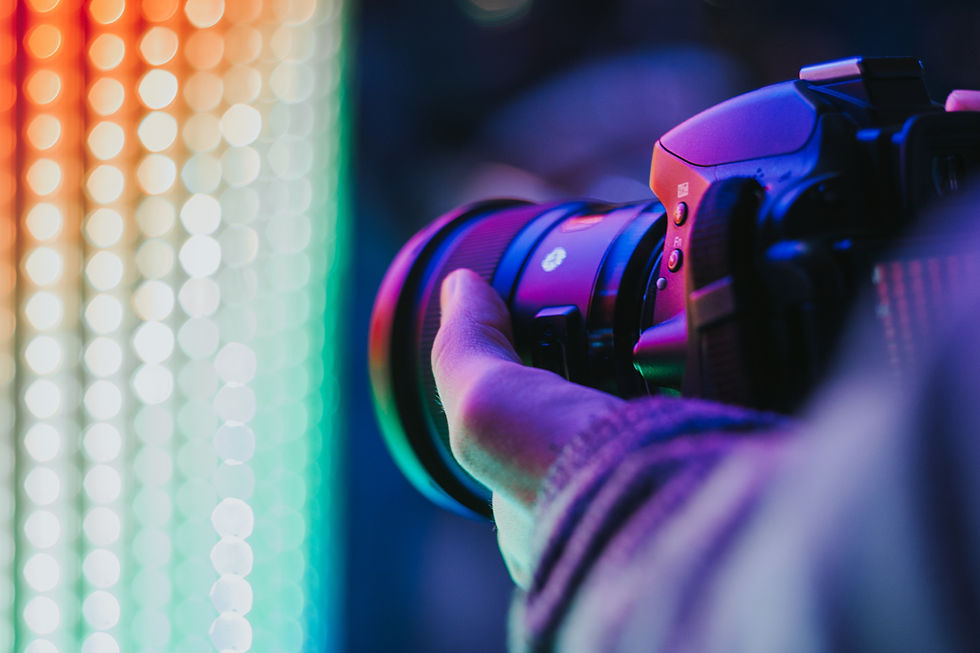Common Misconceptions Beginning Photographers Believe
- Mark Paulda

- Sep 29, 2021
- 7 min read
Updated: Nov 26, 2024
THE BEWILDERING WORLD OF PHOTOGRAPHY
Photography is easily one of the most rewarding hobbies or occupations that a person can practice. It can be visceral and exciting, or calming and meditative. It encompasses science and art, is influenced by leaps in modern technology, but is grounded in the theory of classical composition. In the digital age, photography has now become accessible to all. Cameras have become cheaper, smaller, and are now a standard accessory on the ubiquitous cell phone. Billions of images are uploaded to the Internet yearly, with social media driving forward the real-time documentation of our world.
Despite this, not every person who owns and uses a camera considers themselves a ‘photographer.ʼ For most, cameras are merely a way to preserve their memories and share events. For others, like myself, a camera is a tool that enables us to do much more than merely document. It allows us to turn our artistic vision into a visual reality.
Perhaps you have recently caught the ‘bug,ʼ or maybe youʼve just purchased your first camera or have enjoyed taking pictures using a cell phone and wish to dig deeper into the world of photography. If so, then this tutorial is for you. In this tutorial, I wish to address some common misconceptions that many beginning photographers are led to believe. While I would not be so bold as to call these ‘lies,ʼ they are often spread online via camera forums and even by manufacturers.

Common Misconceptions Beginning Photographers Believe
Many have a grain of truth to them, but I will explain why they are, in fact, misconceptions.
1. YOU NEED THIS TYPE OF CAMERA (Insert Camera Name Of Your Choice Here)
Usually the first step to becoming a photographer is purchasing a camera. For beginners, this can be a frustrating process, and unfortunately, many online citizens and camera companies do little to clear the waters. Iʼll start by giving you a good guideline for purchasing your first camera: any camera is capable of producing quality results in the right hands.
Too many well-intentioned photographers give heavily biased advice when it comes to purchasing a type of camera. You will often hear: ‘You arenʼt a proper photographer if you arenʼt using a DSLR.ʼ Increasingly, you may also hear the counterclaim: ‘DSLRs are rubbish, and mirrorless cameras are the future.ʼ
When I purchased my first camera, I was somewhat discouraged by the disparaging remarks leveled at my choice: an Olympus camera. I vividly remember a member of a photography group I belonged to telling me the Canon 5D was the only way to go. The person then flagrantly waved his camera in the air while clicking the shutter release button. "See!", he said, I don't even have to aim and focus". I can't say I was too impressed by the person to be honest.
While I did not have the Olympus camera for long, it will always have a special place as the first digital camera I purchased. More importantly, the naysayers that berated my frugal purchase were dead wrong. I learned much from that camera, and it was the perfect introduction to composition and post processing. Yes, it had a tiny sensor, the image quality was not stellar, and the controls were finicky; however, it was within budget, and at the time, was the perfect camera for me. On the left, you can see one of the first images that I ever took with that camera.
Itʼs important to note that, yes, certain cameras are better suited to certain types of photography; however, most beginners have yet to find the niche that they wish to shoot within. Choose the camera you want, and donʼt allow anyone else to discourage you. It doesnʼt matter if itʼs a compact camera with a tiny sensor, or even a medium format film camera; the important thing is that it allows you to realize your vision. Interestingly, this misconception is related to the next one.
2. PHOTOGRAPHY IS AN EXPENSIVE HOBBY
This claim is one that certainly has a grain of truth to it. If you browse an online camera store, itʼs easy to imagine spending thousands of dollars on equipment. Every photographer with a spouse has received a critical stare when they announce the purchase of a new lens or camera body. I know I have tho' I play dumb or ignore the judgmental glare.
There is good news, however. Photography does not have to be expensive. When I first became interested in photography, I quickly realized that I would have to be a ‘budget photographer.ʼ Whatʼs a budget photographer? To begin with, a budget photographer may not be able to buy the newest or best camera. The good news is that today,
even cameras a few years old are still more than capable. Consequently, you can save significantly if you buy used gear. If you choose to buy a mirrorless camera, then you can even adapt old film lenses for very low prices.
For the budget photographer, determination and ingenuity can overcome any obstacle. You can shoot bursts and stack images instead of pouring money into ND filters, and you can use a cheap manual flash instead of an expensive automatic one. This isnʼt to say that we should not support camera companies, but rather a reminder that you donʼt need to drop cash on every little challenge you face.
The best part of being a budget photographer is that it forces you to adapt and improvise in the face of obstacles. In the long term, this will make you a better photographer; it encourages thinking outside of the box. If you manage to avoid Gear Acquisition Syndrome (GAS) and concentrate on honing your skills, there is no reason for photography to empty your wallet.
3. IMAGE QUALITY IS THE MOST IMPORTANT THING
There are many types of photographers. One of the most common you will find online is
the ‘pixel peeper.ʼ Closely related to the ‘gear lover,ʼ the pixel peeper is obsessed with examining images at outrageous magnifications. After zooming into an image until they can count the pixels, they will make loud noises about chromatic aberration, shadow noise, and moiré. Some photographers are never satisfied with their equipment, even as camera companies continuously improve image quality. As such, they spend the vast majority of their time buying and selling gear, only managing to take quick snapshots of power lines and close-ups of walls. This means that they are never satisfied with their images, which they in turn blame on their equipment.
There's no need to be so particular. Yes, image quality is important, particularly in certain fields like landscape and real estate photography. You will never hear me complain about the magnificent strides that camera companies have made in boosting resolution and dynamic range; however, image quality alone will not improve your photographs. A poorly composed image taken at 50 megapixels will still fail to capture the imagination of the viewer. Instead of worrying about softness or shadow noise, concentrate on improving your lighting. Donʼt read reviews of high-resolution sensors; read tutorials that enhance your knowledge and inspire you.
For the most part, our cameraʼs abilities exceed our own, but over time, you may find that you need to upgrade your equipment. This is perfectly natural, and always an exciting time. Yes, you will factor image quality into your choice, but remember handling, durability, and features are important too. Most importantly, your camera needs to be a tool that you enjoy using, that doesnʼt get between you and the creative process. Focusing only on image quality will result in uninspired, bland, high- resolution images, and the world already has enough of those.
4. POST PROCESSING IS CHEATING
Even if you manage to dodge the judgmental pixel photographer while online, you may soon come into conflict with the purist. The purist believes that all images are sacred and perfect right out of the camera. To them, any manipulation of a picture is cheating. In their eyes, either you get it right in-camera or you donʼt get it at all.
To be fair, there are some instances where you should not manipulate your images, such as photojournalism. Furthermore, it never hurts to expose as accurately as you can. An accurate exposure that requires less cropping or tweaking will inevitably be a cleaner image. However, there are several reasons why you should ignore this school of thought.
One of the biggest ones is that post processing allows us to eke out the very best quality and detail that we can from our cameras. This is most true when shooting raw. Raw allows the photographer to maximize dynamic range, sharpening, and color control. It also eliminates the possibility of a bad white balance.
Secondly, if you refuse to post process, you are yielding control of the final result to the camera processor. Post processing is still being applied by a predetermined algorithm instead of your own mind. To me, this is unacceptable, as the realization of my vision extends beyond merely tripping the shutter.
Lastly, post processing is an important tool that allows the photographer to develop his or her own flair. Over time, most professional photographers create a unique, recognizable style of processing. An excellent example of this is Ansel Adams, the legendary landscape photographer. Although digital manipulation did not exist in his time, Adams altered his images extensively, making heavy use of dodging and burning to create the gorgeous scenes we admire today.
Itʼs important to note that processing is an entirely personal choice. If you feel more comfortable as a purist, shoot that way. From boosting contrast to swapping out skies, all of it is acceptable if itʼs acceptable to you.
CONCLUSION
These wonʼt be the only misconceptions youʼll hear— many others will no doubt be forced upon you by friends, other photographers, and online citizens. Remember to take every piece of advice with a healthy dose of skepticism. Above all, photography is a subjective discipline, so shoot in whatever manner makes you happy. Be suspicious of anyone claiming that you must or must not do something. Over time, as your knowledge grows, you will develop your own opinions. Share them to help others, but remember not to push misconceptions.




Comments